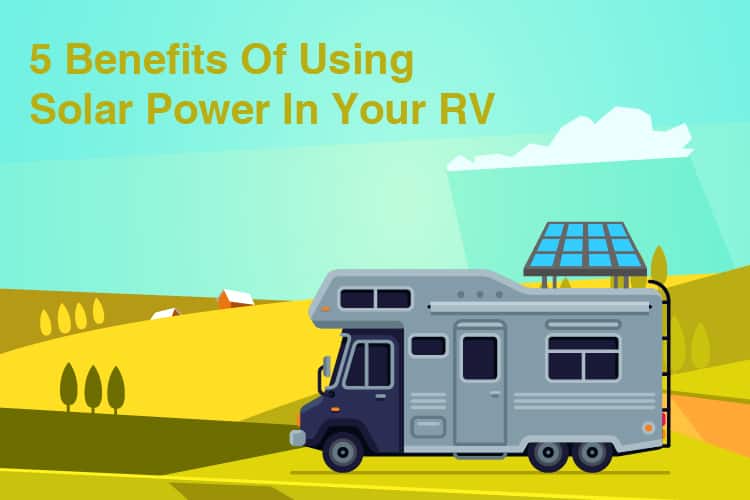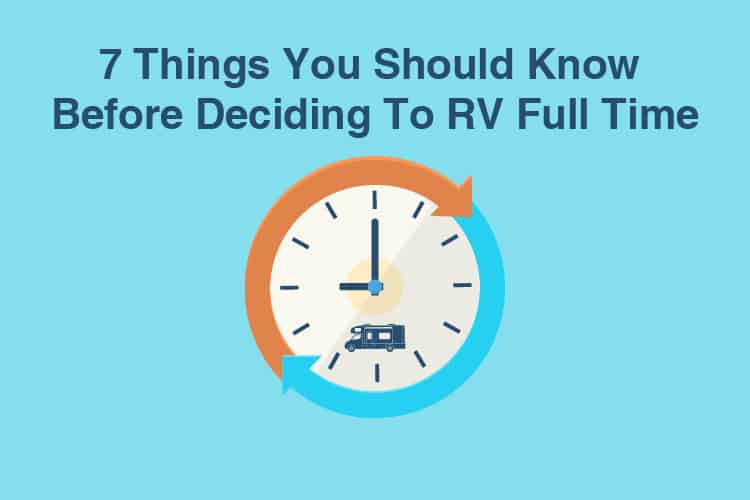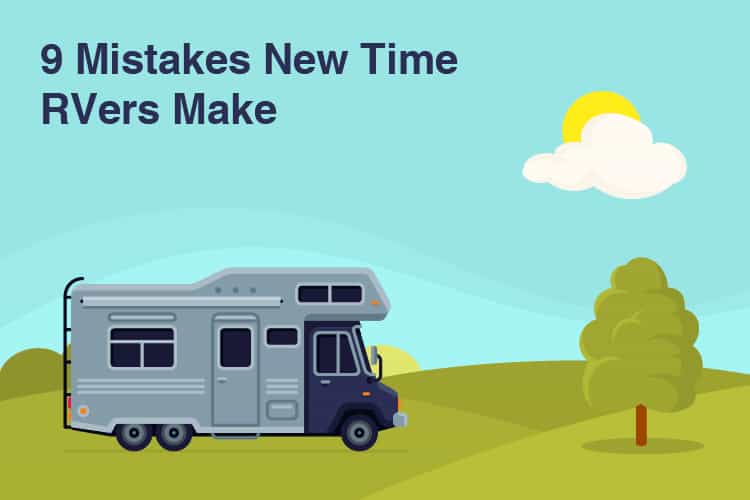With house prices higher than ever before, many people are starting to look for more affordable ways to set up a home. Self-builds, log cabins, and even converted storage containers are all great options. But one of the most popular ways of saving money on housing is by living in an RV full-time.
Unlike a sited house, living in an RV gives you the freedom to move around whenever you like as well. This means you can really live a nomadic lifestyle and follow the sun wherever it goes. Not a lot of people can say that about their homes!
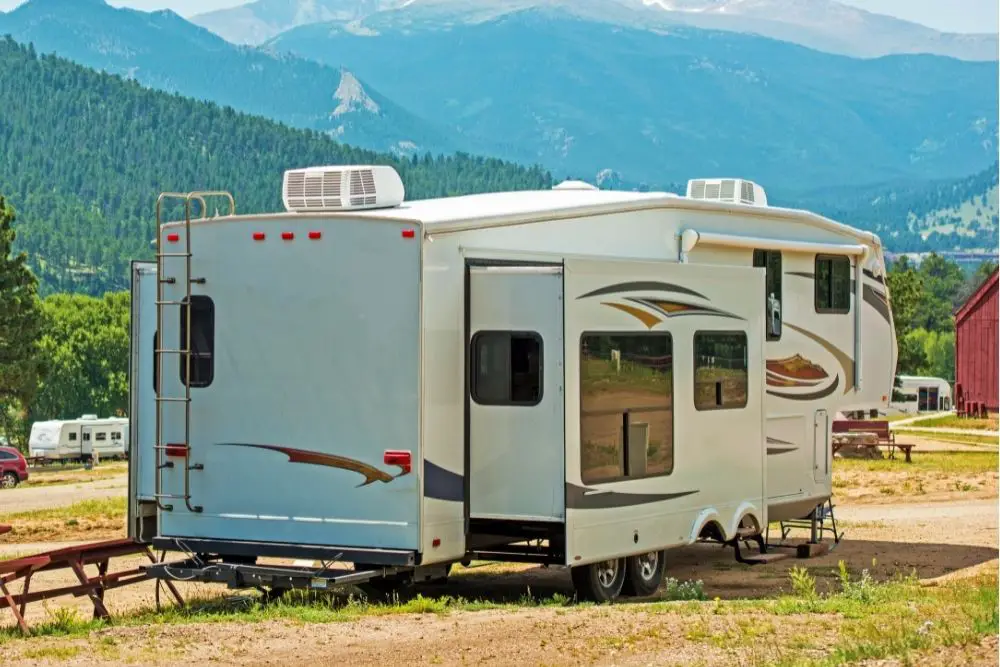
Sounds pretty good, right? But just how much does it cost to full-time RV? Below, we’ll take a look at everything you need to consider before you make the decision to call an RV your permanent home.
Working Out How Much You Can Afford
Let’s start our guide by talking about the actual cost of the RV itself. Prices will vary depending on certain factors. Is the RV brand new? How big is it? And what amenities does it offer you?
As you would when buying a traditional home, you’ll need to work out a budget and stick to it as closely as possible. It’s easy to think that an RV is cheaper and, for the most part, it is. But, if it’s brand new you’ll still have to make a monthly payment just like you would with a mortgage.
You’ll also need to save a chunk of your monthly income for emergencies and mechanical repairs that you may encounter when you’re on the road.
So, before you do anything else, sit down and work out what you can afford each month. There are other factors to consider when doing this such as gas expenses, entertainment, and groceries, and we’ll look at these in more detail a little later on.
The main thing you need to remember is that living in an RV full-time may not necessarily be the solution to your financial problems. In fact, if you don’t work out what you can afford and stick to a sensible budget, you may end up creating even more.
Employment
This is also a good time to talk about how you’re going to afford life on the road. If you’re lucky enough to have a remote job, it’s going to be much easier for you to live in an RV full-time as you won’t be restricted to an office environment.
However, if you don’t have this luxury, you may need to be prepared to do some bargaining with your current employer. Propose to them that your job is one that you’re capable of doing remotely. Or, if it’s not, be honest with them about what you’re planning to do and ask if there is an alternative position they can offer you that will allow you to work remotely.
If there’s no budging, you may have to think about leaving your job and finding one that allows you to work from home. There are certain websites that specialize in these types of jobs and these are definitely worth looking into.
If you’re still not having any luck finding a remote position, you might want to consider taking matters into your own hands and starting your own business.
This is a brave step and you’ll need to make sure you’ve got enough money saved up to cover you while you wait for your income to increase. But, you’ll have the control of being your own boss and you’ll get the flexibility that comes with it.
If you do decide to launch your own business, it’s a good idea to have everything you need to run it in place before you start your life on the road. Otherwise, you’ll just be adding even more stress to the situation.
Seasonal work is another option that’s available to you and, since you’ll be living in an RV, there’s no reason why you can’t find seasonal work all year round.
For instance, you can head to warmer parts of the country during the summer months and work in bars or restaurants. Come winter, you can head to ski resorts and hotels where there are always various seasonal openings available.
Doing this doesn’t give you much scope for building a career with one company, but you’ll certainly be living the full-time RV life and discovering lots of new, exciting places.
Whatever you decide is the best course of action for income, make sure you still have a good work/life balance. One of the reasons you’ve decided to live in an RV full-time is to enjoy life more, get outdoors, and explore new places. If you’re working all the time, you may as well be living in a traditional home.
Of course, if you’re retired and have a good amount of money saved up, this isn’t something you need to be concerned about too much.
Building a Budget
Not sure where to begin when it comes to building a budget? You’re not on your own. To make this a painless process, the easiest thing to do is figure out your fixed and variable expenses. Don’t worry! This isn’t anywhere near as complicated or technical as it sounds. In fact, it’s actually quite simple.
Let’s look at fixed expenses, first of all. These are your expenses that are the same amount every month. This will include things such as your RV payment, your cell phone bill, internet, and insurance.
The key here is to try and keep your fixed expenses as low as possible. Shop around for the best deals rather than going for the first internet or cell phone provider you find. Don’t rely on tradition, either. Just because you’ve been with the same company for years there’s nothing to stop you from leaving them and switching to another (contract permitting).
You may even find that your current providers are able to offer you a better deal when you threaten to leave.
Your variable expenses are those that change from month to month. These are the expenses that you have ultimate control over. These include things such as your grocery bill, entertainment expenses, and clothing.
When you live in an RV full-time, the place that you park your home will also fall into the variable expenses category. For example, parking in an RV resort could cost you over $1000 a month depending on the area. This isn’t exactly something that is going to help you keep your expenses down.
But, as parking is a variable expense, you don’t need to be tied into this insane pricing. Instead, you can join an ‘RV Club’ which helps to reduce your parking prices considerably. Here are three of the best:
- Harvest Hosts: This RV Club offers parking in some of the most fascinating places including wineries, breweries, farms, ranches, and museums.
- Boondockers Welcome: One year of Boondockers Welcome membership only costs the same as the average price for one night’s camping at an RV resort! It works by allowing you to park on private property that has been opened by the owners. This doesn’t only mean you’re able to find interesting places to stay, but you’ll meet some lovely people in the process.
- Escapees/Xscapers: With this membership, you’ll be given a discount on certain campgrounds and RV resorts. You’ll also become a part of an elite group of members who travels with you, giving you the opportunity to make new friends on the road.
Lodging Fees
Another factor you need to consider when working out your variable expenses are your lodging fees. We’ve covered this above in a little detail and you now know that you’re able to purchase memberships that make parking your RV cheaper. However, there are some ways you can save even more money on lodging.
First of all, consider whether you have any friends or family that would be willing to let you park your RV on their property. This is an excellent way to save money as they will likely let you do it for free. Even if you have to pay them a small monthly fee, there’s a strong chance that it will be dramatically cheaper than resort parking.
If you do enough research when you’re purchasing your RV, you may also be able to find one that comes with a Thousand Trails Zone Pass. This lasts for a year and brings the cost of lodging way down, sometimes even to as low as $3 per night. Some even come with a free 30 days deal, saving you even more money in your first month of full-time RV living.
Invest in certain memberships, park on property owned by friends or family and you could easily spend less than $100 a month on lodging fees.
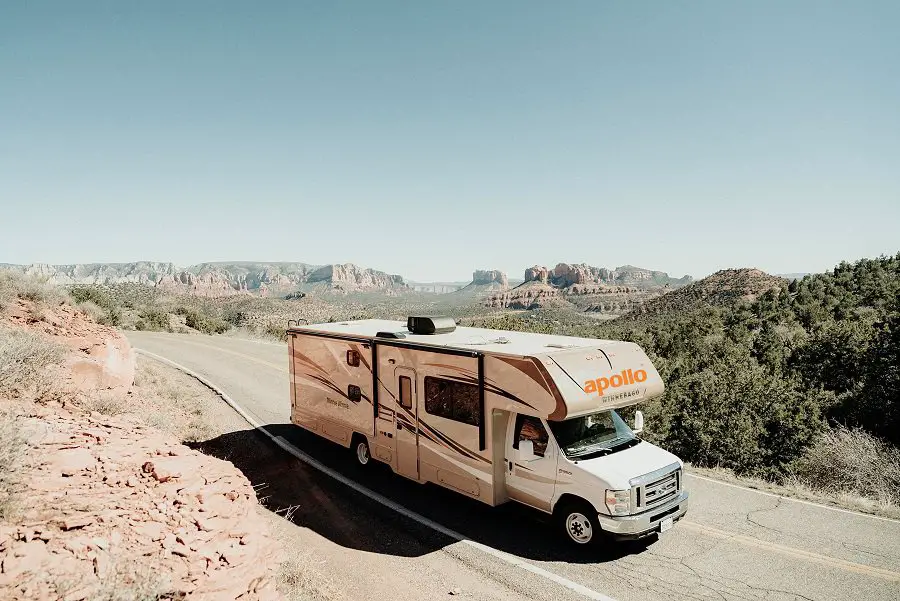
Tolls & Admissions
This is another variable expense. Just like you would if you lived in a traditional home, you’ll want days out at theme parks, attractions, and special events. The more you do, the more expensive it will be.
This doesn’t mean that you have to shut yourself in your RV and do nothing if you want to save money, though! In fact, as with all things to do with life on the road, getting the right memberships will save you money and still give you the opportunity to do some really fun things.
Take a National Park Pass, for example. This costs just $80 a year and gives you access to over 2000 federal recreation sites. It also covers both your entrance fee and standard amenity fees. And, if you’ve got any children under the age of 15, they are admitted for free. Fantastic for days out with family and friends.
You also need to think about toll charges when you’re living in an RV full-time. This includes both bridge tolls and toll roads. The easiest way to save money here is to simply avoid them. However, this can be a bit of a false economy as you may have to go out of your way, using more gas in the process.
So, a good rule of thumb when it comes to tolls is to avoid them wherever possible. If you know it’ll only take you a few minutes to take an alternative route, take it. If it’s going to add hours to your journey, it makes more sense to pay the toll.
RV Maintenance
RV maintenance is another thing that falls in the category of variable expense, but it’s also something that you need to save for just in case. As with any vehicle, an RV will need regular oil changes, new filters, new tires, and a plethora of other expensive maintenance jobs throughout its life.
If you’re lucky, you may go for years without having to spend much money maintaining your RV. But, this doesn’t mean that something won’t go wrong eventually.
One of the easiest ways to save money if something goes wrong is to carry out repairs and maintenance yourself. The internet is your best friend here as there are thousands of tutorial videos online. Once you know what you’re doing, you’ll be surprised how much money you’ll save by sourcing the parts yourself.
However, in the case of a big breakdown or an issue that you simply don’t know how to fix, you’ll need to take your RV to a repair shop. This can come with a big bill, which is why you need to make sure you’re saving money for such a circumstance each month.
Interior Maintenance & Upgrades
It’s not just the things going on underneath the hood of your RV that you need to consider. The appliances inside may need repairing and upgrading from time to time, particularly if you’ve got a used model.
Again, the best way to save money here is by carrying out any repair jobs yourself. Head over to YouTube and you’re bound to find more than one video that clearly explains what you need to do.
As far as upgrades go, this is something that you can do slowly over time. There is a temptation to rip everything out and put all new appliances in. If you’ve got the money to do this, go for it! But, if you’re living in an RV full-time to save money, you’re best to upgrade things over time when you can afford to.
Propane Gas
Unless your RV is a super-modern model that has been designed with cleaner energy in mind, you’ll need to use propane gas to power certain appliances. These can include your furnace, refrigerator, water heater, oven, and range.
The amount of propane you use will vary from season to season. For example, you’ll want to keep the heating on for longer in the winter than you would in the summer. But it’s still something you need to budget for. After all, there’s nothing worse than facing the coldness of winter without enough money in the bank to purchase additional propane tanks.
Of course, you could always ‘chase summer’ as a way of saving on propane. As you’re on the road, you aren’t restricted to a certain area, so you can head to warmer parts of the country and avoid having to use your heating at all!
Generator Costs
When you’re boondocking and you aren’t able to connect your RV to an external electricity supply, you’ll need a generator to power things. There are two things to consider here.
First of all, you need to think about the price of the generator itself. This is a fixed expense as, once you’ve purchased the generator, you won’t have to spend money on another one for quite some time.
Don’t fall into the trap of trying to save money by purchasing a cheap generator, though. These are generally less expensive for a reason and you may end up having to buy a new one long before you expected.
Treat your generator a bit like your RV. Look at its power capabilities and how long the warranty it comes with lasts. Splashing out a little extra money could definitely help save you more money further down the line.
The second thing you need to think about when it comes to your generator is how much gasoline it uses. This is a variable expense. If it’s a gas-guzzler, you’ll need to spend more money in order to keep it running. To work this out, look at its energy efficiency.
To keep an RV powered and to keep your gasoline costs as low as possible, you’ll want a generator rated between 3,000W and 4,000W. However, this obviously depends on your individual usage, so it’s a good idea to approximate your usage before you purchase.
RV Fuel
This is another variable expense that will ultimately depend on how often you move your RV. Put simply, the more regularly you travel, the more money you’ll spend on RV fuel. If you’re parking up for a month outside a family member’s property, you’ll spend much less than you would if you were moving to a different location every night.
It’s also worth noting that fuel prices, particularly for diesel vehicles, change from state to state. So, this is something else you need to research and consider before deciding where you’ll be heading.
Dining Out
Even the keenest home cook needs a night off from time to time, especially as you find new and exciting places to eat on your travels. This is why you also need to factor dining out into your variable expenses.
We’d recommend putting aside around $100 a month for dining out. This should allow you to visit a restaurant once or twice a month, although this obviously depends on where you’re dining and the menu prices.
One thing you shouldn’t do is accidentally fall into ‘vacation mode’. This is a hard habit to beat, especially when you first start full-time RVing as you’ll definitely feel as though you’re on vacation and, as such, you’ll want to eat out every night.
However, doing this will cost an awful lot of money which could be better spent on fuel, maintenance, and other essential living costs. So, make a special date once or twice a month to eat out at a newly discovered restaurant, and cook from the comfort of your RV at all other times.
Entertainment & Hobby Expenses
Living in an RV and getting to explore everything the wide world has to offer is undoubtedly exciting. However, it’s still nice to do the things you’ve always enjoyed up until now. This includes going to the movies or the theater, buying a new game for your console, or treating yourself to a new houseplant.
Whatever you do for enjoyment, you need to factor entertainment and hobbies into your variable expenses.
As we’ve already discussed, you can purchase annual passes and memberships to some amazing places which will help you keep these expenses in check. But, it’s still worth putting a little money aside each month so you can do something you really enjoy on the odd occasion without creating too much of a dent in your bank account.
And, as with dining out, it’s important not to fall into ‘vacation mode’ when it comes to entertainment. There will be a temptation to leave your RV and spend money on the different experiences each place you visit has to offer.
But, by creating an entertainment budget and sticking to it, you’ll be able to do new and exciting things while still leaving money for essential purchases.
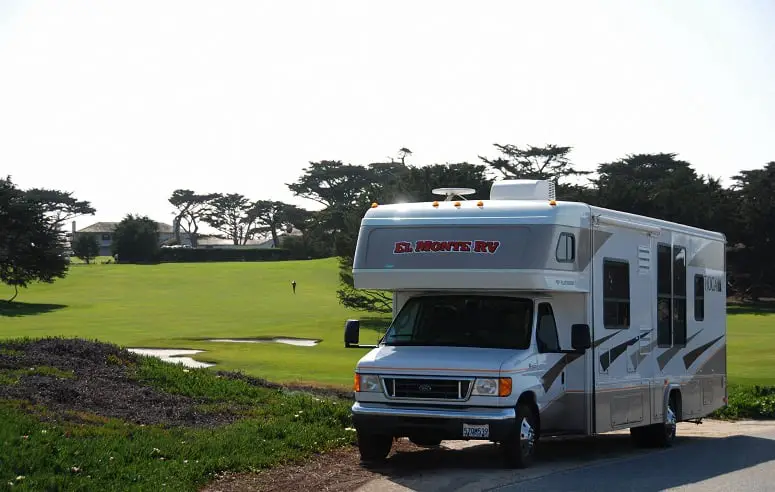
Groceries
As we’ve discussed, it’s not a good idea to dine out every night when you’re living in an RV full-time as you simply won’t save any money. Instead, you’ll need to cook at home for 95% of the month and, to do that, you’re going to need to go grocery shopping.
This is an expense that can be both fixed and variable, depending on what you need each week. For instance, some weeks you’ll need cleaning supplies as well as food. Other weeks, you’ll only need ingredients for the meals you’re planning to make.
The best thing to do here is to set a grocery budget with a little wiggle room on either side. Aim to come under budget, but leave enough money for those instances when you need to go over.
Buying in bulk may seem like a good way to save money on your groceries and, while this is true if you live in a traditional house, it’s not as convenient when you live in an RV. This is simply because you’ll have less space to store as many items.
This doesn’t mean that you aren’t able to keep your budget in check, though. Many grocery stores list their items online with up-to-date pricing. By doing a little research, you’ll be able to find which store has the items you need at the cheapest price.
Coupons are a great way to save some money on groceries as well, so try to find them and use them wherever possible.
Household Appliances
One of the best things about RVs is that they come with integrated appliances such as refrigerators, freezers, ovens, and ranges. However, there are certain household appliances that they don’t include and you’ll need to purchase these separately.
This could be anything from a kettle to a television. If you already own these items, you won’t really need to factor them into your budget. But, if you’re starting from scratch, you’ll need to think about what you need to make life on the road as comfortable as possible.
To save as much money as possible, we’d recommend asking friends and family if they have anything they can give you. If not, head to the internet and take advantage of the many sales and deals you can find online.
Pets
A pet is a great addition to your life on the road. Dogs in particular will give you the opportunity to get out and explore some of the planet’s most beautiful places. However, while a pet is excellent company, they do come with their own expenses.
The first of these is food. Pets need feeding and you’ll need to think about whether you’re able to afford their food and your own. Some even need special diets, which can increase the cost of their food even more.
Secondly, pets need medication. This isn’t necessarily for pre-existing conditions, but to stop them from getting worms, fleas, and other parasites. They need annual vaccinations as well. So, you’ll also need to think about these when considering your fixed expenses.
Cell Phones
Whether it’s an emergency situation or simply to check in with friends and family, you’ll still need a cell phone for certain things no matter how off-grid you intend on going. You have two budget options with a cell phone as they can be considered either a fixed expense or a variable expense.
If you’re purchasing a cell phone that comes with a contract, it’ll be a fixed expense. You’ll pay the same amount of money each month and, in turn, you’ll be provided with a set number of calls, texts, and data.
This is the best option to go for if you’d still like to keep in contact with as many people as possible while you’re on the road. It’s also better if you’d like to research what an area has to offer before you set up home there for a few weeks.
If you’re less fussed about keeping in constant contact with people and you’d rather find out what somewhere has to offer when you get there, a prepaid cell phone might be a better option. This would be considered as a variable expense as the amount of money you spend will change depending on how often you use your phone.
Internet
It’s virtually impossible to do anything these days without the help of the internet. If you want to book a spot at an RV resort, pay your bills, research grocery costs, or anything else, you’ll need to be connected to the web!
This can be one of the biggest challenges you’ll face when you’re planning to full-time RV. This is because they aren’t designed to be in a permanent position, so there’s no real way of establishing a permanent internet connection.
You do have a few options though, and each comes with its own costs.
The easiest way to get internet in your RV is to use your cell phone as a hotspot. You will need a cell phone with a good data allowance and a great connection in remote locations to do this.
You can also add a hotspot router to your existing cell phone plan, but this usually comes with an extra monthly cost. This will increase your fixed expenses slightly.
Finally, you can rely on WiFi signals from the places you’re lodging. If you’re on a friend’s or family member’s property, you can simply log into their home WiFi (with their permission, of course).
This is definitely the cheapest option. However, it isn’t without its issues. Relying on other people’s WiFi doesn’t always guarantee you a connection to the internet. And, depending on where you park, you may go for days on end without any internet connection at all.
Miscellaneous
There are many things that fall into the miscellaneous categories, and each of them can be considered as a variable expense. These are things such as birthday and holiday gifts for friends and family. It also includes those random, unexpected things that pop up throughout the year.
The best way to plan for miscellaneous expenses is to set aside a set amount of money each month. This will grow over time and, when these things come up, your bank account won’t have to take as much of a hammering.
Storage Units
Many people decide to sell off most of their clothing, furniture, and other possessions when they embark on their full-time RV adventure. However, those sentimental items that you simply can’t part ways with will need to be stored away in a storage unit.
The main reason for this is to keep them safe. Life on the road is unpredictable and an RV doesn’t offer you the same level of security as a traditional home. The last thing you want is for someone to break in and steal your beloved possessions.
You also won’t have as much room in an RV as you would in a traditional home, so you’ll need somewhere to keep your things until you’re ready to call time on your full-time RV life.
A storage unit can be considered as a fixed expense as, in most cases, it will cost you the same amount of money each month to rent one. The price will vary depending on how much space you need though, so it’s worth looking into properly.
Likewise, it’s also worth working out what you need to keep and what could be sold. Cutting down as much as possible won’t only reduce the amount of money you need to spend on a storage unit, but could put some immediate cash straight in your pocket.
You also need to think about how long you intend on being on the road. If you’re certain that full-time RVing is the best choice for the rest of your life, a storage unit may be unnecessary as you’ll never really need to use whatever you’re storing again.
Financial Advisors
One of the main reasons why people choose full-time RV life is to save money. But what are you going to do with the money that you do save? A financial advisor will help you invest it wisely. They’ll also be able to help you reduce your fixed expenses as you first embark on your adventure.
However, financial advice doesn’t come for free so you’ll really need to think about whether or not you’d benefit from it. Some people swear by it, while others see it as an unnecessary expense.
It’s really a matter of personal preference but, as the number in your bank account grows, we’d recommend looking into seeking financial advice to help you make the most of your money.
Insurance Premiums
There’s no getting around the fact that you’re going to need multiple insurance premiums when you’re RVing full-time. These will be vehicle insurance, contents, insurance, and health insurance. You may also benefit from getting a pet insurance premium if you’re thinking of getting a furry friend for the road.
Your insurance premiums will be a fixed expense that will be unlikely to change dramatically from year to year. However, it’s worth shopping around and finding the best bargain possible before you sign on the dotted line.
Take a little extra time to research each of your insurance premiums thoroughly and you may find that you’re able to get a good amount of cover for a relatively small price.
As with the rest of your fixed expenses, you may also be able to keep your costs low year on year by threatening to leave your current provider. In most cases, they’ll try to retain you as a customer by offering you a special price.
Creating a Task List
As you can see, the amount of money it costs to live in an RV full-time is a personal thing that really depends on your individual circumstances. But, once you’ve worked out both your fixed and variable expenses, you’ll have a clearer idea.
If we’re talking averages, however, you can expect to pay just under $2000 per month to live in an RV full-time. This includes your RV payment, insurance premiums, groceries, and entertainment. It also includes your budget for fuel, tolls, and maintenance.
Once you’ve worked out your personal expenses and you have a figure that you know you’ll be able to afford, you can start your life on the road! But, before you do, you’ll need to get certain affairs in order.
Below, we’ll show you how to create a task list that helps you efficiently leave your old life behind and get organized for your future.
1. Set a Date
Before you do anything else, you’ll need to set a date that your full-time RVing journey will begin. This doesn’t only give you something to work towards, but it acts as an indicator as to how much time you have left to get everything done.
2. Decide What to do With Your Home
This will be different for each person depending on your circumstances. If you own your home, you might make the decision to sell it all together so that you won’t have to worry about making mortgage payments alongside your RV payments and other expenses. Doing this can put a little extra money in your bank account too, especially if you own it outright.
You might also decide to rent it out while you enjoy life on the road. This is a good option if you’d like to keep your mortgage payments up to date and put some extra cash in your pocket. You’ll also have the opportunity to go back home once you’ve come to the end of your full-time RV journey.
If you currently rent your home, you’ve got the easiest way out as you’ll simply need to end your tenancy with your landlord. Make sure you’re not breaking your contract though, as this could end up costing you money.
3. Cancel Your Utilities
Next, start calling your utility providers (gas, electric, water, etc) and inform them that you are leaving the property. You may have to explain to them that you’re not moving to another property and that you need to cancel them completely as well as negotiate your way through the offers they’ll throw at you to try and retain you.
But be patient! This can be one of the most frustrating things on your task list, but it’s something that you need to take the time to do properly. If not, you could find that your credit is affected, which is something that takes a very long time to recover from.
You’ll also need to check any contracts you’ve signed with your current utility providers and make sure that you’re not breaching any agreements. If you are, you may end up having to pay a lump sum of money to them before they’ll let you leave.
4. Declutter Your Life
Once you know what you’re doing with your current home and you’ve informed your utility providers that you’re leaving, the next step is to start decluttering your life. This doesn’t have to be a big, stressful task. It can be managed by doing a small amount of work each day in the lead up to you leaving your home.
The best thing to do is work room by room. Go through your drawers, cabinets, and shelves and assess what you need to take with you. Put these things to one side, then assess again and determine what could go into storage and what could be sold.
Use the same approach when you’re looking at your furniture as well. Bear in mind that most RVs come fully equipped with sofas, tables, beds, and everything else you need to feel at home. Again, work out what you want to keep in storage and what you want to sell.
The biggest thing you need to remember when you’re decluttering is not to rush or get rid of too much at once. When you do this, you may end up living without the things you need for a few weeks before you’re due to leave home. It can also take a real emotional toll on you.
5. Start Packing
Once you’ve decided what you’re taking you’ll need to start packing your belongings. Again, don’t do this too prematurely as you’ll only have to open the boxes again to get to the things you need!
The week of your move is plenty of time to pack everything up. If you plan things carefully enough, you may not even need to bother packing your things into boxes. Simply park your RV in front of your property, carry your things out, and put them in their new home!
You will, however, need to pack your storage items into boxes. Some storage units have quite strict policies on packing, so make sure you’ve checked the rule beforehand and that you’re complying with them.
It’s a good idea to pack your storage-bound items and take them to the storage unit about a week before you’re due to start full-time RVing. This gives you enough time to get used to them not being around, and leaves you more time to start organizing your essentials.
6. Visit Friends & Family
Depending on where you’re heading in your RV and how frequently you’ll be moving around, there’s a chance that you might not see your family and friends for a while. So, take a moment away from organizing your belongings and packing boxes to visit them whenever you can.
If you’re pressed for time, you could even throw yourself a leaving party that gathers everyone together and allows you to say your goodbyes in one go.
7. Hit the Road!
Follow each of the steps above and when the day finally comes that you’re ready to hit the road, you’ll have a stress-free transition into your new life. All that’s left to do now is decide where the first place you’ll be headed is.
Conclusion
There you have it, everything you need to think about when it comes to how much it costs to live in an RV full-time. As we’ve mentioned, the cost will be a very personal thing that ultimately depends on how much you can afford and what your spending habits are like.
However, take into consideration all of the things we’ve listed above and you’ll have a clearer picture of how much money you’ll need to start your journey. You’ll also be able to work out how much you’ll need to keep the wheels turning!


